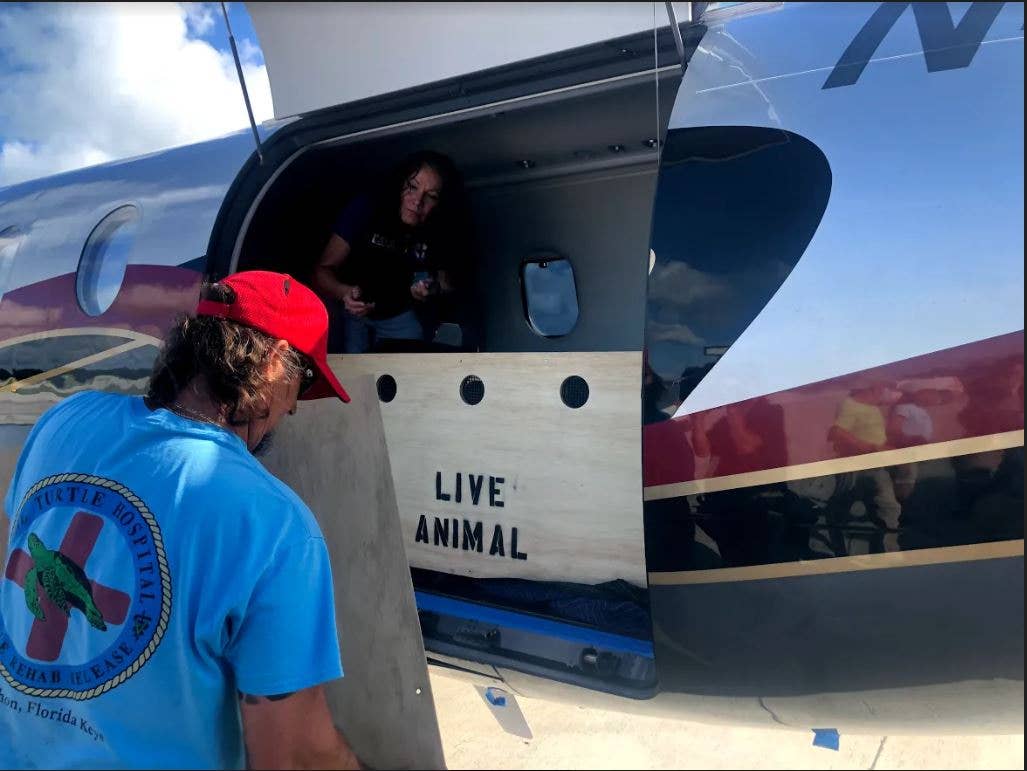
The turtle’s crate was loaded into the Pilatus PC-12NG, thanks to the aircraft’s four-and-a-half-foot wide cargo door. Courtesy: Turtles Fly Too/David W. Hartman
A pair of pilots based in the Florida Keys came to the rescue over the weekend to help a 230-pound sea turtle looking for a ride to his new home.
It all started when word got out that a sea turtle named Matthew needed to be moved from a rescue facility called Sea Turtle Hospital in Marathon, Florida, to his new home in South Padre Island, Texas. Matthew has been unable to live in the wild since being injured by a boat propeller. The long drive overland to Texas would have been too stressful for the turtle, making air travel the only option.
That’s when a nonprofit group called Turtles Fly Too swooped in. Since 2014, Turtles Fly Too has been connecting pilots and aircraft to help endangered species that need to travel long distances.
On Sunday, pilots Al and Susan Simmons volunteered to fly their 2009 Pilatus PC-12NG based near Florida Keys/Marathon International Airport (KMTH) 1,039 miles to Port Isabel-Cameron County airport (KPIL) in Corpus Christi, Texas.
The nine-seat, single-engine turboprop has an MTOW of 10,450 pounds—certainly enough to tote a huge sea turtle and then some. Turns out, one of the most challenging parts of the journey was loading the precious cargo. Members of the Marathon Fire Department used special equipment to carefully lift the 340-pound crate containing Matthew onto the airplane.
Thankfully, at nearly four-and-a-half feet wide and more than four feet tall, the airplane’s cargo door was able to accommodate a big box with a giant turtle tucked inside.
“This is a big turtle,” Al Simmons told Flying. “It required a big door. But we managed. If you take the back seats out of a Pilatus, you can carry a lot of stuff.” Al Simmons, a retired businessman who’s been flying since he was a teen, was able to use the airplane’s cargo tie-down kit to ensure the crate was securely attached to the deck. The kit includes special straps to secure the cargo and brackets that run the full length of the aircraft.
Once Matthew was secure, the Simmons couple began its four-and-a-half hour mission across the Gulf of Mexico, Al flying right seat and Susan in the left seat.
During the flight, the turtle remained in place, even when a bit of turbulence made for a few bumps. Per expert specifications, Matthew’s temperature during the voyage was to be maintained between 70-75 degrees Fahrenheit, with minimal handling and noise. Handlers are directed to use COVID protocols including masks, gloves, and distancing during transport.
Matthew arrived in Texas safe and sound and was immediately transported to the nearby Sea Turtle Inc., a rehab facility founded by the late aviator Ila Fox Loetscher, one of the original Ninety-Nines international organization of women pilots. “I hope that turtle lives another hundred years,” Susan Simmons said.
‘I Do This for my Grandkids’
Turtles Fly Too is the brainchild of businessman and pilot Leslie Weinstein, who developed a passion for helping sea turtles during his boyhood days growing up along the Florida coast. In 2014, Weinstein was approached for help transporting a sea turtle to an aquarium in Iowa. He used his connections to enlist help from volunteer pilots.
“I didn’t realize I was going to be doing this a lot,” Weinstein recalled. Soon, the National Oceanic and Atmospheric Administration asked Weinstein if he could continue organizing similar flights. Thus, Turtles Fly Too was hatched.
In fact, NOAA and other groups call on Turtles Fly Too when flights are needed to help endangered species threatened by things such as entanglement, injury, or being stunned by exposure to cold water.
The private group also works with the U.S. Fish and Wildlife Service and the Florida Fish and Wildlife Conservation Commission.
“I do this for my grandkids and everybody’s grandkids,” Weinstein said. “I want them to have the same thing that I had when I was growing up. The Kemp’s ridley sea turtles are heading for extinction—make no mistake. Money doesn’t mean anything to me when it comes to saving these endangered species.”
During its short seven-year existence, Turtles Fly Too has already gathered a long list of pilot volunteers, said the group’s executive director, Bonnie Barnes. More than 380 have signed up, nationwide.
“But we still need more pilots and we also need donations,” she said. So far, they’ve transported more than 4,000 turtles and other animals in total, thousands of miles across the U.S.
“After helping these endangered species, you just can’t feel any better,” Barnes said. “It’s so rewarding.”

Subscribe to Our Newsletter
Get the latest FLYING stories delivered directly to your inbox






